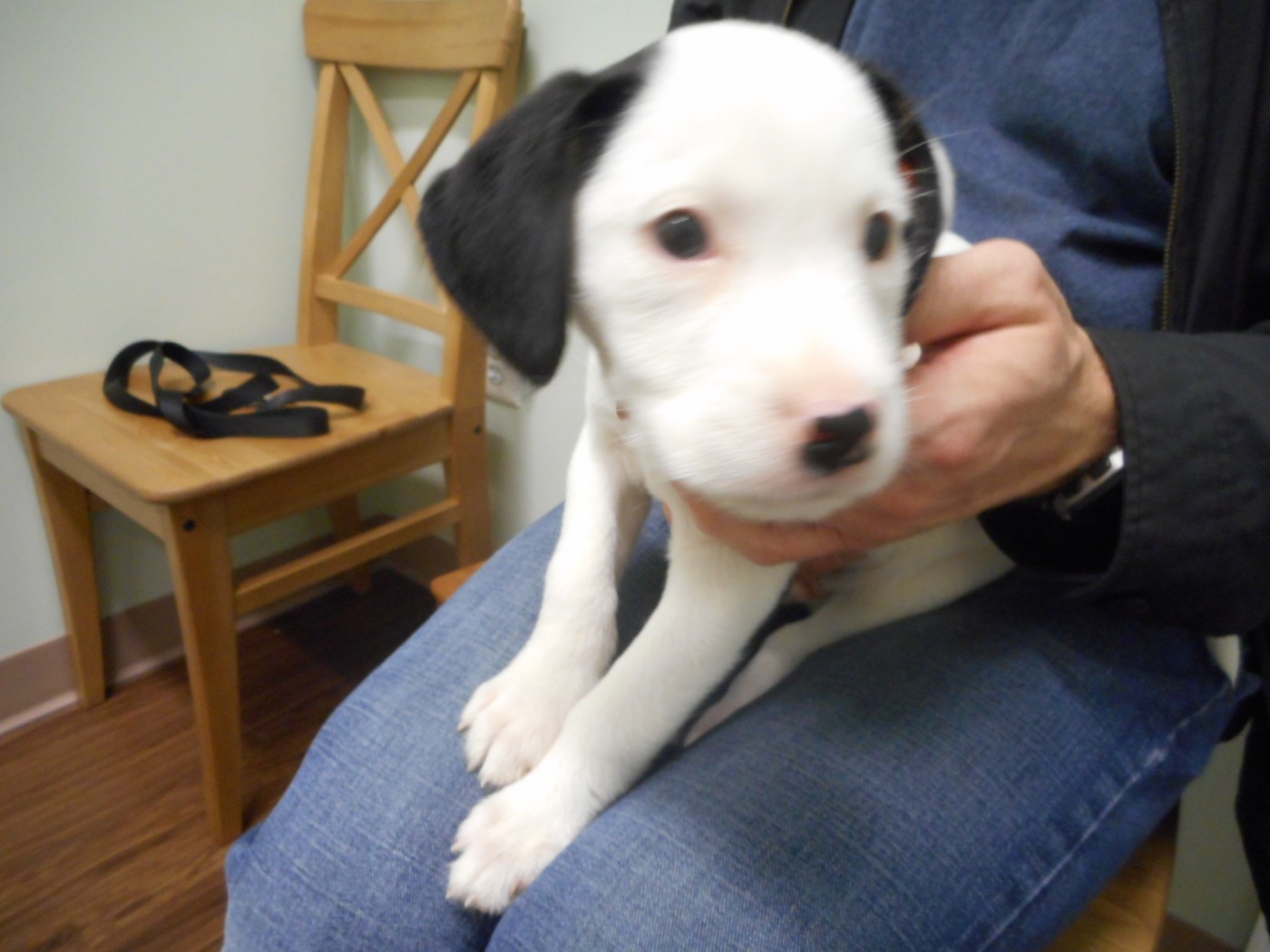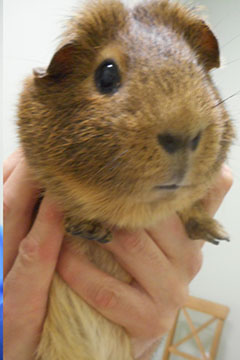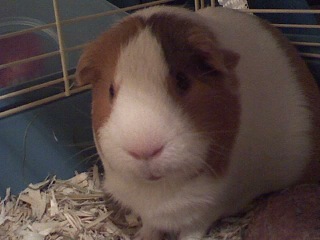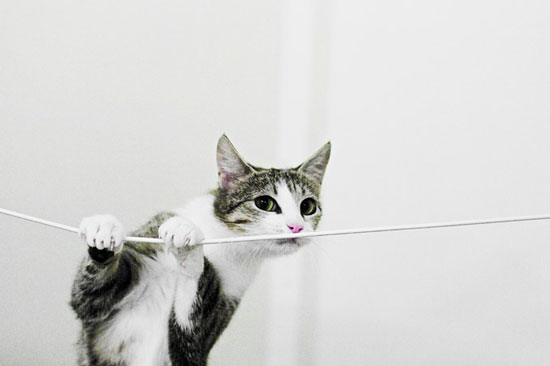Posts in Category: Family Pet Veterinary Practice News
Puppy Vaccines

Waiting for his exam!
At Family Pet Veterinary Practice, we want to get your puppies off to the right start. A big part of that is vaccinating them against dangerous and debilitating diseases. This should be started when young to protect them early, especially as the antibodies they received from their mothers will be decreasing by the time of adoption.
During the exam, we will discuss your dog’s vaccine options. A few of the vaccines are done in all dogs (The “Core Vaccines”), while others (The “Optional Vaccines”) may be recommended depending on your dog’s risk and lifestyle. Our goal is to educate you on your options, not to pressure you into additional services. We can provide as many or as few vaccines as needed!
Core Vaccines
Rabies – Any mammal, including people, can become infected from a bite wound or other contact with a rabid animal. Commonly infected wildlife are raccoons, foxes, and bats. Due to the health risk to people, this vaccine is required by law. Puppies need to have their first rabies vaccine between 3 and 6 months of age. Here in Maryland it is good for 1 year, and each subsequent booster is good for 3 years.
Distemper – This is a combination vaccine that protects from distemper (of course), adenovirus or hepatitis, parainfluenza, and parvovirus. Most puppies coming into our office will have been vaccinated for this when very young, and require boosters every 3-4 weeks until at least 12 weeks of age.
Optional Vaccines
Leptospirosis – This disease is spread by infected wild animals, who urinate the bacteria into the ground or water. Our dogs may pick it up through cracks in their skin or by drinking it in contaminated rain puddles or streams. The bacteria causes liver and kidney disease, so we recommend this vaccine to most of our clients.
Lyme – Lyme disease is spread by deer ticks (and we have a lot of deer!). In dogs, lyme disease causes joint pain, poor appetite, reduced energy, and occasional cases of kidney failure. We always recommend using a flea/tick product to prevent exposure, but the vaccine is available in case there is a lapse in the tick control.
Bordetella – Also known as “kennel cough”, this is a contagious disease spread from dog to dog. Kennels require it for boarding, but your dog may pick it up at groomers, dog parks, obedience/training classes, and other events where many dogs come together. The honking cough it causes is highly annoying and uncomfortable, but treatable.
Canine Influenza – This virus is also contagious among dogs and causes cold like symptoms. Under 10% of those infected can develop serious pneumonias or death.
Veterinary Care for Guinea Pigs
At Family Pet Veterinary Practice (FPVP), we have a special interest in seeing rabbits, guinea pigs, chinchillas, rats, hamsters, and other rodents, as well as the odd ferret, hedgehog, or sugar glider. We know that big hearts and personalities can come in small packages, and the value of a pet should have nothing to do with purchase price!
One of the more frequent “exotic” small mammal pets we see is the guinea pig, so we will focus our first blog post on this adorable animal.
Guinea Pigs as Pets
Guinea Pigs make good pets, and are a good first choice for teaching pet care to children. They are gentle and interactive, and easy to keep in the home. They love to eat, and some will squeal and chatter excitedly before meals! If scared, they tend to freeze or run for cover. If housed, fed, and cared for properly, they rarely get sick. Their life span averages 5-6 years, with some living to 8.
Housing
We recommend using cages with a solid bottom (wire mesh can cause foot injuries). They do not need a top if the walls are 10” tall or more, since they are unable to jump or climb very high. A guinea pig should have a minimum of 7.5 square feet of space, but the more room they have the happier and healthier they will be. Use the following link for more specifics and some great pictures of cage setups: https://www.guineapigcages.com/
The substrate of the cage can be either wood chips (although avoid oil-containing products like cedar and pine) or paper (store bought paper pellets, or shredded newspaper). Guinea pigs should have a shelter for privacy. These are commonly store-bought huts, igloos, or tubes. Cardboard boxes can be used, but as the pigs chew on everything, these won’t last very long!
The cage should be kept out of direct sun, indoors between 65 and 75 degrees. The area should have good ventilation but not be drafty.
Diet
A sipper bottle should be provided with clean fresh water, and changed daily. Guinea pigs should be fed a small amount of pelleted food (about 1 Tablespoon per guinea pig per day). They should be provided plenty of timothy hay (ad lib, or unlimited!). The diet should be supplemented with a variety of vegetables. Guinea pigs require vitamin C in their diet, so make sure to offer items such as peppers, broccoli, and leafy greens such as kale, cabbage, chard, or spinach.
Guinea Pig Veterinary Visits?

We recommend bringing in new pet guinea pigs for a physical exam. We want to make sure your pig is healthy, and we can discuss husbandry to try to prevent potential problems.
Guinea pigs also require regular nail trims. The nails on their front paws often curl, and need to be kept short to avoid becoming ingrown. Their teeth also grow throughout their lives (both the incisors you can see, and the molars in the back of the mouth that are hidden). Some guinea pigs don’t chew enough hard foods or items, or have crooked teeth, and need to have their teeth trimmed or filed down.
If you have multiple guinea pigs, you may need us to spay or neuter them to prevent unwanted breeding. If female guinea pigs don’t have babies when young (6-9 months), the fusion of their hip bones will prevent them from giving birth without emergency C-section later in life.
Guinea Pig Problems
Many guinea pigs will hide their illnesses for as long as they can. If there is a decrease in appetite, thirst, fecal pellets, activity, or vocalizations, you should schedule a veterinary visit so we can check things out right away. Some of the common things we’ve seen are:
Gastrointestinal Problems – Guinea pigs cannot vomit, but they do develop diarrhea. If they stop eating altogether, lethal toxins can form in their gut (ileus).
Growths – Older guinea pigs may form cysts and skin tumors that can be surgically removed.
Injuries – From fights with other guinea pigs, accidents in the cage or house, falls, etc.
Parasites – We often see guinea pigs who have acquired lice or mites. These cause itchy skin and fur loss. Severe itch can also trigger seizures.
Respiratory Infections – These cause wheezing, sneezing, and conjunctivitis.
Urinary tract infections – These cause frequent urinations, pain, and bloody urine. Some guinea pigs also develop bladder stones.



